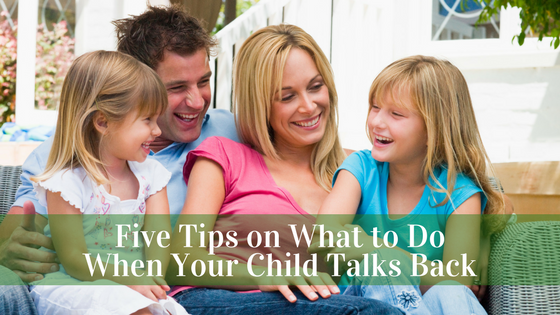
It happens to the best of us and makes our blood boil at times! What should you do when your child talks back? You definitely do not want this behavior to continue and become a habit or escalate! Talking back can cause parent-child communication to deteriorate rapidly.

- This may be time for a family meeting (although do not call it that in front of your kids unless you want to see how fast they can run!). Consult my free cheat sheet on holding a family meeting.
- If the talking back involves name-calling, cursing, or extreme disrespect, impose consequences immediately and without discussion.
- If the talking back is the usual teen off-handed, not well thought out comments, ask your child, “I think I know what you mean, but can you think of a nicer way to say that?” This gives your child an opportunity to rephrase his/her comment respectfully, rather than you telling him/her what to say. This a non-critical way to handle the problem.
- Ask your child what he/she is feeling by asking, “So, are you angry (frustrated, disappointed, annoyed) with me?”
- Try to find out how your child wants you to communicate with him/her. Ask how he/she would like you to phrase requests, comments, etc. If changing a word or two can improve communication, why not try it?
A family meeting is important to establish a baseline for how you and your child need to communicate with each other. Do you allow name-calling and cursing? How do you feel about negative body language such as eye-rolling and tongue-clicking? Decide together and collaborate on what is acceptable and the consequence of not communicating in an acceptable manner.
Impose consequences on which you have agreed at the family meeting immediately and without discussion. Simply respond with: “This is what we agreed on.”
By giving your child an opportunity to rephrase their comments, it helps him/her think of ways to be more appropriate which can easily be remembered since it with be in his/her own words. It is a less authoritative way of handling the situation and gives the child a chance to take responsibility for his/her words.
Asking about feelings is so important! What you might perceived as anger, could be fear or anxiety. Find the feeling to increase understanding and get to the root of the conflict!
Asking how your child prefers to communicate is important in order to get positive results. Some kids remember things better if they are texted or written down on a list. Some kids hate certain words, phrases or a tone of voice which can set them off. Everyone has his/her preferences. Try to respect your child’s preferences since you expect him/her to respect yours.
Original content by Kathleen A. Matchunis, Professional Academic and Life Coach, providing customized coaching for teens and parents in person or via Skype. Website: www.connectinginc.net Tel. 954 294 9708. Like us on Facebook: facebook.com/connectinginc. Call for a complimentary consultation!


